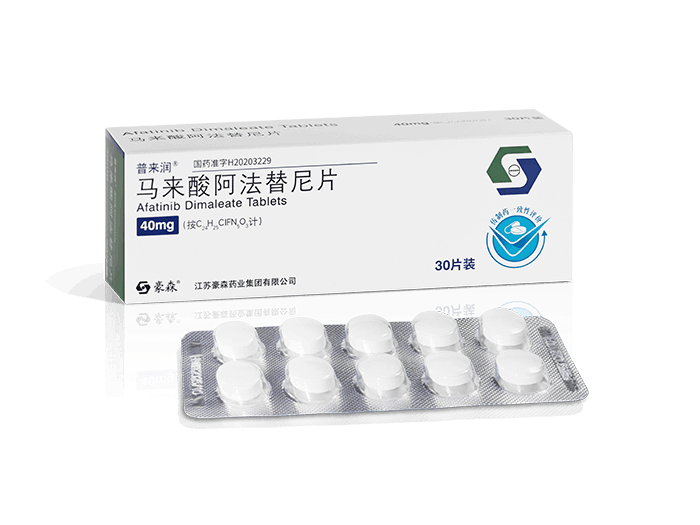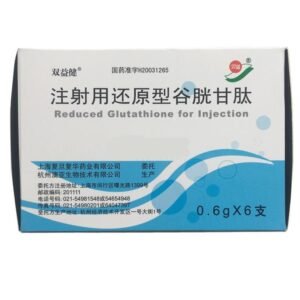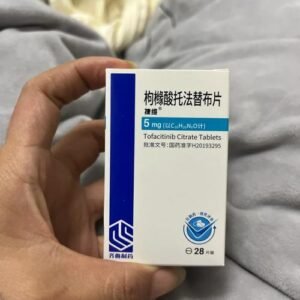Afatinib Dimaleate Tablets
Function:
Locally advanced or metastatic non-small cell lung cancer (NSCLC) with sensitive mutations in the epidermal growth factor receptor (EGFR) gene and not previously treated with EGFR tyrosine kinase inhibitors (TKI). Non-small cell lung cancer (NSCLC) with locally advanced or metastatic squamous histology that progresses during or after platinum-containing chemotherapy.
Dosage:
The recommended dose of this product is 40 mg once daily. There is currently insufficient evidence to support patients receiving greater benefit from the 50 mg dose. This product should not be taken with food. Take this product at least 3 hours after eating or at least 1 hour before eating. There are no trials to study the safety and effectiveness of this product in patients with renal impairment. Patients with mild or moderate renal impairment do not need to adjust the starting dose. It is not recommended for patients with severe renal impairment (creatinine clearance < 30mL/min) receive treatment with this product. Patients with Hepatic Impairment Afatinib exposure was not significantly altered in patients with mild or moderate hepatic impairment. No starting dose adjustment is necessary in patients with mild or moderate hepatic impairment. This product has not been studied in patients with severe hepatic impairment. Treatment with this product is not recommended for this population. Age, race, sex No dose adjustment is required based on the patient's age, race, or sex. Pediatric Population The safety and effectiveness of this product have not been studied in pediatric patients; therefore, treatment with this product is not recommended for children or adolescents. P-glycoprotein inhibitors If P-glycoprotein inhibitors are necessary, they should be administered in alternating doses. The P-glycoprotein inhibitors should be administered 6 hours after afatinib administration (P-glycoprotein inhibitors twice daily dosing) or 12 hours (P-glycoprotein inhibitors dosing once daily). For patients requiring P-glycoprotein inhibitor therapy, the daily dose of afatinib can be reduced by 10 mg if intolerable. After discontinuation of a P-glycoprotein inhibitor, treatment can be continued at the previous dose as long as tolerated. P-Glycoprotein Inducers For patients requiring long-term treatment with P-protamine inducers, the daily dose of afatinib may be increased by 10 mg whenever acceptable. After stopping the P-glycoprotein inducer for 2-3 days, afatinib treatment was continued at the previous dose. Alternative Administration Method If swallowing the entire tablet is not possible, disperse the afatinib tablets in approximately 100 ml of non-carbonated drinking water. No other liquids should be used. Tablets should be placed in water without crushing and stirred occasionally for up to 15 minutes until the medicine is dispersed into very small particles. The dispersion should be taken immediately. Rinse the glass with approximately 100ml of water and drink. The dispersion may also be administered via gastric tube.
Adverse reactions:
Diarrhea Diarrhea, including severe diarrhea. Skin-Related Adverse Reactions Rash/acne has been reported in patients treated with this product. Generally, the rash presents as a mild or moderate erythematous and acneiform rash that may occur or worsen on sun-exposed areas. Bullous, vesicular, and exfoliative dermatoses have been reported, and rare cases may be Stevens-Johnson syndrome. Interstitial lung disease (ILD) Among 4257 patients treated with afatinib in various clinical trials, 1.6% developed ILD or ILD-like adverse reactions (e.g., pulmonary infiltrates, pneumonia, acute respiratory distress syndrome syndrome or allergic alveolitis), 0.4% of whom died. Asian patients (2.3%; 38/1657) had a higher incidence of ILD than white patients (1.0%; 23/2241). Severe Hepatic Impairment Liver failure, including death, has been reported in less than 1% of patients during treatment with this product. In these patients, confounding factors include preexisting liver disease and/or comorbidities associated with progression of the underlying malignancy. Symptoms of keratitis include acute or worsening eye inflammation, watery eyes, light sensitivity, blurred vision, eye pain, and/or red eyes. Effects on the ability to drive and use machinery Afatinib has a minor effect on the ability to drive and use machinery. During treatment, some patients reported ocular adverse reactions (conjunctivitis, dry eye, keratitis), which may affect the patient's ability to drive or operate machinery.
Drug contraindications:
If you are allergic to this product, it is contraindicated during lactation. It is contraindicated during pregnancy.
Share:
Products
Our offers
Health Classification
Let us work together to protect precious health




























